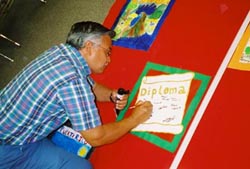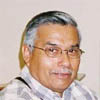Oral History - Luis Sámano
Jose Luis Sámano was born in Irapuato, Mexico, and grew up in Mexico City. After working in the family store, he began to work for car dealers and gained skills as a mechanic. At age 24 he came to the United States, and, with the support of his employers and the Berg family (his future in-laws) in Eugene, he was able to get permanent residency.
Luis began working at an automobile dealership in Eugene, but decided he needed to improve his English language skills and began to take English courses at LCC.
 Luis takes English classes at South Eugene High School (MP3, 1:30 min, 1.7MB.) Luis takes English classes at South Eugene High School (MP3, 1:30 min, 1.7MB.)
I first time I got acquainted with LCC - They were having classes for foreign people at South Eugene [At South Eugene High School?]
Yeah. South Eugene High School. And it was the class that I took English. It was just, how to, you know, how to speak. And all was mostly the people that was in that class was people from Denmark and Norway and France, it was just mostly. I was the only Hispanic person back then. Matter of fact, I think I was the only Hispanic person in this town, because I feel so strange surrounded by myself on it. So I took those, that classes in there for about two years I go, we go in the night, from six to nine, three hours a night. But it was a lot of fun. I had, I met a lot of real neat people, whose who cook and they bring their own little specialities from Denmark and Norway. And of course, you know, for me being by myself on it. I had to, it was really welcome to have that food.
Luis became an American citizen after taking citizenship classes at LCC.
The instructors at LCC asked me if I wanted to take some citizenship classes which were also taught at South Eugene High School . … After finishing those classes, many of the same people that I took the English classes with also became citizens.
Luis began to take courses at LCC to improve his job skills.
The first time that I took mechanics classes was at the vocational school at 200 North Monroe. At that time it was just like a big warehouse. I felt that I needed to take more training because of the advancements in automotive technology. So, whenever I had a chance, I started to take evening classes to sharpen my skills as a mechanic. Every time that I needed any kind of special skills, I turned to LCC. I took welding classes at the main campus. Then when I changed jobs and I needed to know a more about small engine repair, I came back again and took classes at the main campus.
When I started to work for the 4J school district, I knew that although I had pretty good skills as a mechanic, if I wanted to advance into a management position I would need more training. So I looked again at LCC and took a series of management classes on how to deal with personnel issues at the Downtown Center.
Luis took classes at LCC to help him manage his property.

Luis Sámano writing his name on a wall hanging created by students in the Rites of Passage program, 2004.
|
I bought some property and decided I wanted to know the legal part about owning property. So I took some property management classes at Willamette High School . ... And I continued to look at more classes at LCC. Later I took house repair so I could do my own repairs on the property that I owned.
The latest class that I took last year was how to use a computer - at least I learned how to move the mouse around.
Luis retired in 2001, but soon became involved in the Rites of Passage program.
 Luis teaches in the Rites of Passage program (MP3, 3:55 min, 4.5MB.) Luis teaches in the Rites of Passage program (MP3, 3:55 min, 4.5MB.)
I got a niece and she come from Mexico last year and she attended this class. And I knew they was having these classes again. And I came over here and talked to Connie Mesquita [coordinator of the Multicultural Center ] to see by any chance had any kind of help with the Latino/Latina program.
As a matter of fact, what excited me was because me and my son Michael we went to last year, we went to be presenters on the same day to the class [Rites of Passage?] and, with the Puertas Abiertas ["Open Door"]. And I saw the faces how excited they were, and how much they was absorbing what we talking about Mexico and customs and what I knew and the way we helped what my kids went through in school.
So this year I knew they was having this program again and I asked Connie to see if she needed some help - to volunteer help them do something to help them learn. And she said, you know, we need someone to drive the kids around and take them to different places. And so that's how I came up. And they said, well, now that you are here, we'd like you to help with the whole program and helping us in the classroom. So that's what I'm doing and I'm having a good time.
The Rites of Passage is composed by four groups: the Native Americans, the Asians, the African-Americans, and the Latino/Latina program. Their purpose is to teach them a little bit more about our culture, that they don't get that kind of teaching in the school, to make them a little bit more knowledgeable, about, you know, where do their ancestors come from, all their heroes, and all the people that's involved in that there.
On other days we get our own presenters for our own groups and talk about the background, and we have a very, very . group, we have a architect, and we have people in the community that they are professionals in this town and they come and talk to the kids to LCC and talk to the students about the pressures they went through in their schooling and what education they have and try to convince the kids to continue their education. And then they talk a little bit about what our culture is and who are our heroes in the Latino people. And then we have a little bit . some art and a little dance. So it's a pretty full day for the kids.
[What is the benefit of this experience for you?]
It's been to, just to see... Because a lot of these they kids are already about third and fourth generations, so they really don't hear. And for me to come up and to tell them about what their great-grandfathers--parents came from and the struggles they went through and their . just to see their faces is a great satisfaction for me.
Luis is grateful for the opportunities his family gained from LCC.
I am grateful that we have this type of institution (community college) and that my kids could finish college. Debbie studied psychology and then nursing. Without college she couldn't do what she does now. I am so happy that Michael finished high school. He never thought he would continue, but he has. At LCC Michael was inspired by his teachers to continue.
I am grateful for all the support the college has given to all of my family, including my niece who is taking ESL.
Summary of Interview: Total time: 65:20 minutes
Time/Minutes |
Summary |
0:00 |
Introduction; born and raised in Irapuato, Mexico |
2:00 |
Childhood in Irapuato; family moves to Mexico City |
4:25 |
About parents, brothers,and sisters |
7:20 |
Working in family store; going to school |
15:35 |
Working as an auto mechanic |
17:50 |
First trip to the United States |
20:48 |
First visit to Eugene, Alvadore, and Portland in Oregon |
23:30 |
Return to Mexico; work in Volkswagen dealership; return to Eugene |
28:00 |
Berg family in Eguene, marriage to Nancy Berg in 1964 |
30:50 |
Takes English courses at Lane Community College |
33:30 |
Takes citizenship and mechanics courses at Lane |
36:20 |
Dual citizenship |
38:20 |
Children, Michael and Debbie; remarriage to Ema Perez; stepdaughter Consuela |
40:10 |
Takes mechanics, welding, property management, and computer classes at Lane |
45:30 |
Work at car dealerships, at 4-J school district |
50:50 |
Courses at Lane, children attending Lane |
56:12 |
Puerto Abiertas (Open Door) program, Rites of Passage program at Lane |
63:00 |
Family has benefited from Lane |
Return to: Oral History - Sámano Family
|




